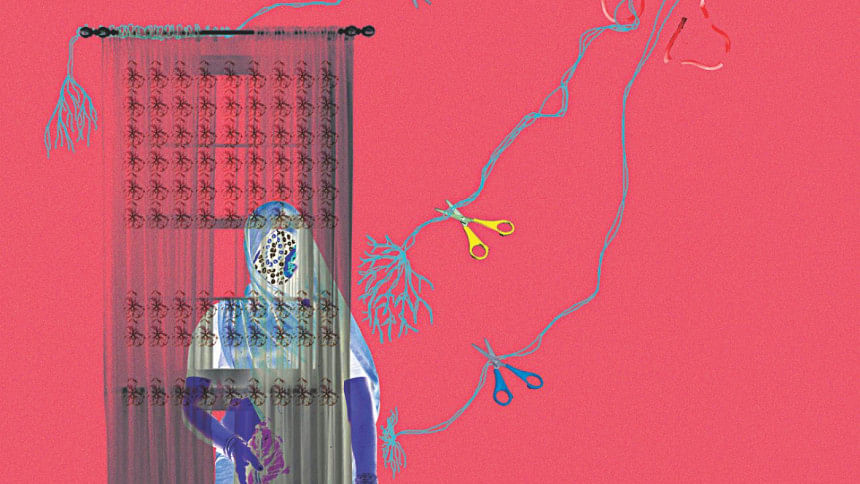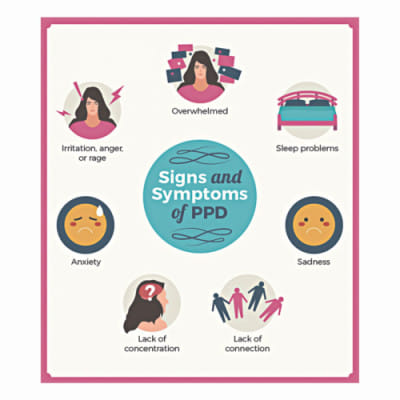This isn't what I expected

Books and movies make pregnancy seem like a bout of ill-health, involving sporadic fainting spells, morning sickness and dramatic mood swings. I experienced none of those. In fact, my nine months of child-bearing were hands down the best days of my life, filled with moments of pure bliss
Thus, when the baby finally arrived, I expected nothing but extraordinary happiness. And happy I was, perhaps for the first few hours; but soon, my melting pot of emotions turned into a panic attack. I felt like I was stuck inside a horror movie in which you have to constantly suppress the impulse to scream—getting startled at the sight of shadows and expecting the worst out of every situation. My emotions simply did not make sense to me. I like to think I was rational during my whole pregnancy, which is why the start of my motherhood felt even more confusing and taxing. I remember bawling my eyes out because my baby would not feed, overwhelmed beyond words—feeling inadequate as a mother, terrorised by every person around me, half expectant of harm coming from every possible direction… it's at that moment that I looked up and recognised the black cloud of depression that had unknowingly settled overhead.
During my pregnancy and immediately after my childbirth, a lot of people came to me and shared their stories of postpartum depression—some were friends, some family members and some acquaintances I had not spoken to in the last 10 years. They shared with me memories of what had probably been their darkest hours, completely unsolicited. In all honesty, initially it left me baffled wondering how their stories were meant to help me.
It was only when I was fighting my own battle that I understood the full extent to which postnatal depression can take advantage of the vulnerability of your mind that post-pregnancy creates—how the gush of hormone-driven feelings you have, good or bad, can be totally outside of your control; and how, at the end of it all, motherhood is a journey so fraught with self-doubt, that no one, not even our partners, fully understand how much of any shortcomings we tend to blame ourselves for. I also realised that it was one of those phenomena, which, until and unless you are at the receiving end yourself, you don't quite believe the full fatality of.

I have witnessed some brutal dismissal of depression in general within our communities. I address this write-up especially to those naysayers and their ignorance on this issue. The shaming, for new mothers claiming to be affected by depression, at a time when they are expected to be the happiest, can be devastating. I have heard elderlies call it the new fad because apparently it did not exist 30 years ago. For those of you who have been lucky enough not to have experienced it—congratulations. You are privileged. And the least you can do is be a decent human being and not rub it in our faces. Thank you.
For those of you like myself—who have been and are fighting this currently, you are not alone and you are definitely not exaggerating any of it. The waves of the blue that come and go are, in fact, real. The only reason I have been able to identify that and differentiate between feelings triggered by actual ongoing incidents in my life, and postpartum anxiety and depression, is because of the wonderful support of the people who have called, texted and messaged to provide me with the bleak details of their own symptoms. Now I know what a wealth of information that had been, how valuable it would prove to be for my mental wellbeing. To those people I say—I am indebted.
Identification is key and often the first step to a solution is acknowledging postpartum anxiety and depression. It is a condition that is real and can be fatal for both mother and child if it remains unaddressed for longer periods of time. Postpartum is one of the most challenging times in a new mother's life as it is, without additional triggers from her surroundings worsening her condition. Every single mother has her own group of people that she seeks advice and reassurance from when she is dealing with a crisis. If she is not approaching you out of her own free will, it may mean—you, unfortunately, are not one of them. Now, if despite that, you decide to impose your unwarranted opinion, it only means the person's happiness is not on your agenda.
I am not an expert in this field myself but the good news is that there are sufficient help and services available out there. I urge anyone of you who think they may be susceptible to PPD to get immediate attention and not let the ignorance of people around you make light of matters. I wish you all the best in your road to recovery.
Naaz Fahmida Ahsan is an anthropologist and a recent mother.

 For all latest news, follow The Daily Star's Google News channel.
For all latest news, follow The Daily Star's Google News channel. 



Comments